Superman and Belonging
The stranger in a strange land becomes a friend.
Super/Man: The Christopher Reeve Story got me to rewatch Superman: The Movie. The documentary is well worth viewing, whether you’re a fan of those original Superman movies or simply want to learn about an inspiring (though very sad) real-life story.
I’m much better equipped to discuss Superman than the real man. So, yes, watch the documentary, but here, let’s focus on the 1978 movie.
Over the years, I’ve occasionally heard people claim that Superman isn’t interesting because you can’t hurt him. Superman: The Movie makes it abundantly clear that you can hurt him (and I’m not referring to the kryptonite).
The film portrays Superman as a young man craving human connection. Whether he’s Kal-El, Clark Kent, or Superman, he’s the sole survivor of a dead planet, which can make for a lonely existence.
The opening scenes depict an icy, sterile Krypton, where Jor-El stands alone among his peers. He knows the planet is dying, but they refuse to believe him. They even threaten him with imprisonment. Jor-El fails to save his world, but he and his wife Lara may be able to save their son.
The two discuss the prospect of rocketing their infant son to an alien world, never to return—never to have anywhere to return to. The script (by Mario Puzo, David Newman, Leslie Newman, and Robert Benton) treats the situation with the appropriate gravity.
Lara notes how primitive Earth is, and Jor-El says that their son will need that advantage to survive.
Jor-El: He will look like one of them.
Lara: He won’t be one of them.
While Jor-El lists all the physical advantages Kal-El will attain, Lara lists the emotional burdens he’ll carry on an alien planet.
Jor-El: His dense molecular structure will make him strong.
Lara: He’ll be odd. Different.
Jor-El: He’ll be fast. Virtually invulnerable.
Lara: Isolated. Alone.
These few lines lay out the dichotomy of the character. It’s like he’s describing Superman and she’s describing Clark Kent.
Jor-El and Lara spend their final moments ensuring that their son has a chance at life. Ultimately, their love frees Kal-El from the icy sterility—and death—of Krypton.
As a teenager, Clark doesn’t fit in. While the other kids drive off to play records and enjoy each other’s company, poor Clark has to stay behind and clean up the football field. Frustrated, he kicks a football into the clouds and decides to let loose. He outraces a train, grinning the whole time, reveling in the exercise of his natural abilities, feeling like himself for a change.
But then he stops and surprises the other kids. How the heck did this guy get across town so fast? Weirdo.
And young Clark is again alone, frustrated, struggling to contain all his unusual and unprecedented potential. His adoptive father understands—the boy wants to tell everyone what he can do; he wants them to see who he is. Jonathan Kent gives his iconic “You are here for a reason” pep talk, and at least for the moment, young Clark feels a little less alone.
But then Jonathan dies of a heart attack on the spot.
“All those things I can do, all those powers, and I couldn’t even save him,” Clark says at his father’s grave, invulnerable but in pain.
As Clark prepares to leave home, we see him surrounded by the vast Earth, small and alone. Director Richard Donner composes several images in this vein throughout the movie. Another follows soon when Clark treks across the Arctic wilderness.
Meeting his birth father for the first time (or a holographic representation of him), Clark asks a natural question: “Who am I?”
“Even though you’ve been raised as a human being, you are not one of them,” Jor-El says, emphasizing the point that his wife had made back on Krypton.
Jor-El shares his knowledge and wisdom with his son over the course of twelve years, and we hear various snippets, such as “In the next year, we shall explore the human heart.” He also issues this reminder, which we heard earlier in the movie: “You are forbidden to interfere with human history.”
Only after this do we finally meet Superman, the adult Clark Kent, and Christopher Reeve.
At first glance, Reeve’s Clark and Superman seem like two totally different people, and the way he shifts back and forth between them is nothing short of impressive. But what’s even more impressive is how Clark and Superman overlap even though they’re so different. That’s the brilliance of Reeve’s performance. He’s not playing two separate people; it’s more like a Venn diagram.
Clark exaggerates his awkwardness and clumsiness to distance himself from Superman, but I don’t think it’s entirely an act. He is an alien, after all, and he doesn’t naturally fit into a purely human setting. Superman exudes some of the same dorky energy as Clark, but it’s more refined and natural in the unconventional tights.
When he’s Superman and helping people, he’s doing what he was always meant to do. He’s graceful and genuine, as well as happy. Clark Kent, however, is not a natural role for him (not for this version of Superman, anyway, though later incarnations are a different matter). He’s out of his element. Compressing himself into the Clark Kent role is always going to be an uncomfortable fit.
Look at this exchange:
Clark: Really, Lois, supposing that man had shot you? Is it worth risking your life over ten dollars, two credit cards, a hairbrush, and a lipstick?
Lois: How did you know that?
Clark: Know what?
Lois: You just described the exact contents of my purse.
[Clark peeks in her purse]
Clark: Hmm. Uh, wild guess.
That doesn’t sound like a man trying to keep a secret. That sounds like an alien who’s still figuring out how to act around humans.
And he’s still lonely. After he tries and fails to ask Lois out, we see him standing alone in a great big hallway, unsure of himself.
When Clark first meets Lois, he pretends to struggle to open a bottle for Perry. Lois shakes it up and loosens it, causing it to spill all over Clark when he finally pops it open. She apologizes and says she didn’t mean to do that, to which Clark responds, “Well, of course not, Lois. Why would anyone want to make a total stranger look like a fool?”
Later, when Superman first meets Lois, he’s just saved her from falling out of a helicopter. She’s still processing the shock of having nearly died and learning that a man can fly while carrying a helicopter with one hand, and Superman tells her, “Well, I certainly hope this little incident hasn’t put you off flying, miss. Statistically speaking, of course, it’s still the safest way to travel.”
This is the same character, adjusted for different contexts. Both statements are sincere, earnest, and true to who Superman is, and neither follows standard social conventions. The first one strikes Lois as odd and awkward. With the second, it’s hardly the strangest thing going on.
When Lois recovers from her shock enough to ask Superman who he is, his response is meaningful: “A friend.” That’s what he aspires to be.
A sequence of super-feats follows, as Superman thwarts various crimes, catches a plane, and even rescues a cat from a tree. It’s fun for the audience because it’s pure joy for Superman. He’s putting bad people in their place (without hurting any of them) and being a friend to decent people in need, amazing and delighting them in the process. He’s finding his place in the world.
But the loneliness remains. In a deleted scene, he shares his joy with the artificial Jor-El in the Fortress of Solitude, happy to speak to someone openly, and the ghost of his father cautions him against an excess of vanity.
Jor-El: Do not punish yourself for your feelings of vanity. Simply learn to control them. It is an affinity common to all, even on Krypton. Our destruction could have been avoided but for the vanity of some who considered us indestructible. If not for vanity, why, at this very moment, I could embrace you in my arms, my son.
The image fades, leaving Superman all alone once again.
It’s a shame that scene was cut, because it enriches Superman’s next scene with Lois—a scene about human connection involving two people who aren’t great at it. An interview serves as the pretense, but they genuinely want to get to know each other. They’re both a little clumsy in their own way at first, with Lois jumping straight to asking about his marital status and Superman not giving a second thought to revealing the limits of his X-ray vision to the press.
But then the flight is magic. It’s a joyous experience for both of them, but for different reasons. For Lois, the impossible has become reality—she’s actually flying with a man who might actually be the real deal. It’s a whole new experience and a whole new way of looking at the world.
Flying isn’t new for Superman. Flying with a partner, however, is extraordinary. He shares his gift with somebody and thereby receives a tremendous gift in return—the experience of genuine friendship.
After Superman leaves, Clark shows up, and there’s this wonderful moment where he entertains the idea of revealing his secret to Lois. While she’s in another room, the glasses come off, and Clark stands taller and straighter, displaying the full spectrum of his persona in a span of seconds. That teen boy who wanted to show off and tell everyone about his powers is still in there.
Later, Superman foils Lex Luthor’s scheme. The Man of Steel repairs the San Andreas Fault and saves countless people. He looks upon his mighty works and smiles, satisfied at a job well done. But then he hears Lois—suffocating, dying.
He’s too late. All those things he can do, all those powers, and he couldn’t even save her.
Once again, he appears small and alone against a vast expanse of desolation, just him and the dead body of the person who meant the most to him.
But maybe this time he can do something.
This, of course, brings us to the famous (infamous?) feat of reversing the rotation of the Earth to reverse time itself.
To give the movie the benefit of the doubt, the intent might be that Superman is flying so fast that he simply travels back in time, and then he changes course to reenter the timestream. Super-speed time travel was already a well-established comic book trope by this point. Reversing the Earth’s rotation could just be the whimsical visual representation of this process.
In any case, while the execution is over the top, the ideas surrounding it are solid.
Before changing the course of a mighty planet, Superman hears one final reminder about how he’s forbidden to interfere with human history. But he chooses to defy his father, just as his father defied the Kryptonian council, and just as his Earth parents defied Earth authorities by keeping the strange spaceship child and raising him as their own. Here, Superman becomes his own man following his own moral compass. He’s not striving to play God with all of humanity. Rather, he defies authority to save one person, and he goes no farther.
And he succeeds. Lois lives, and Superman is smiling again. (And he would have been smiling even more if not for Jimmy’s untimely arrival.)
The movie ends with Superman delivering Lex Luthor and his bumbling henchman to a prison. The warden thanks Superman for his service, teeing up the final line.
“Don’t thank me, warden. We’re all part of the same team,” Superman says.
I never appreciated how perfect that closing line is. It represents the culmination of Superman’s character arc. The lonely alien has found a home on Earth as a friend to the human race.


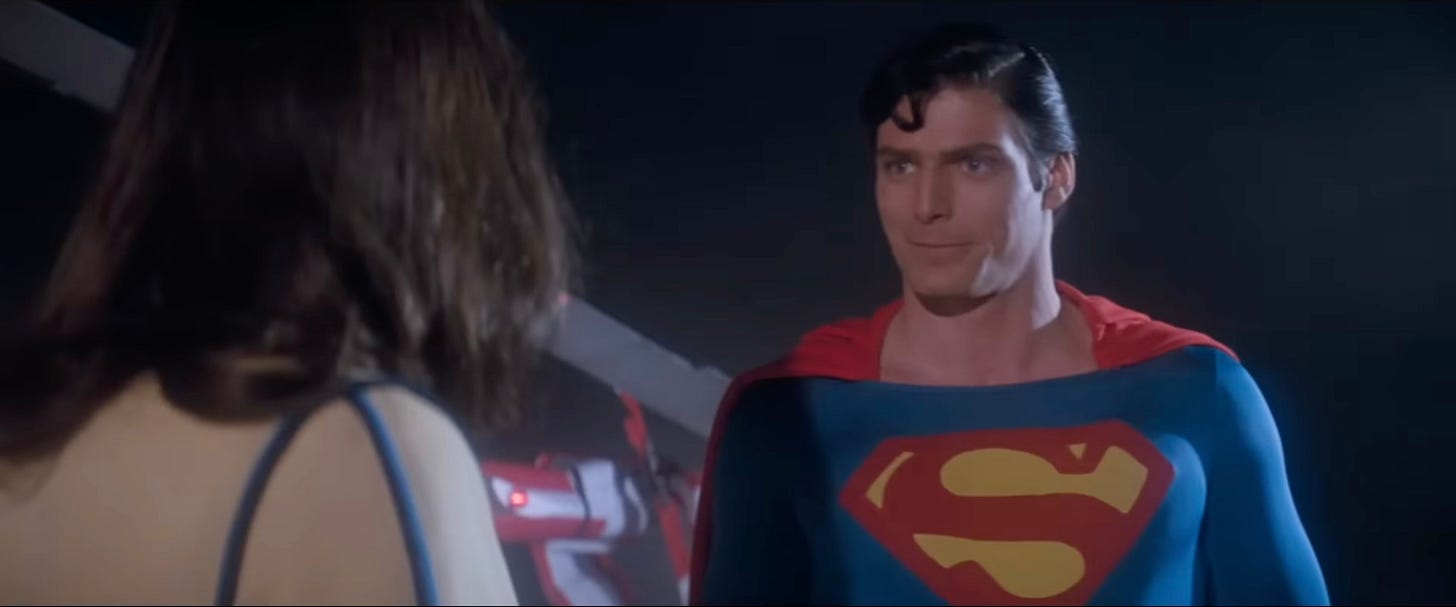
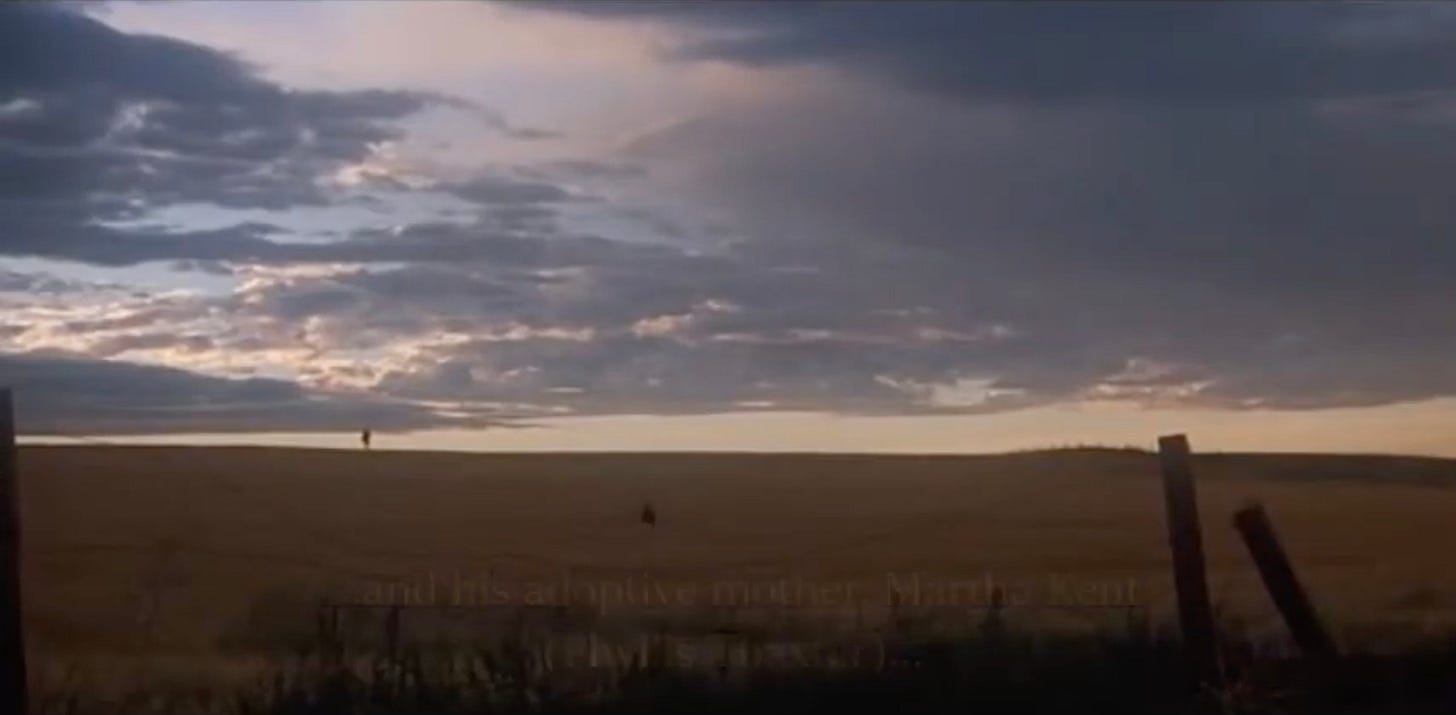


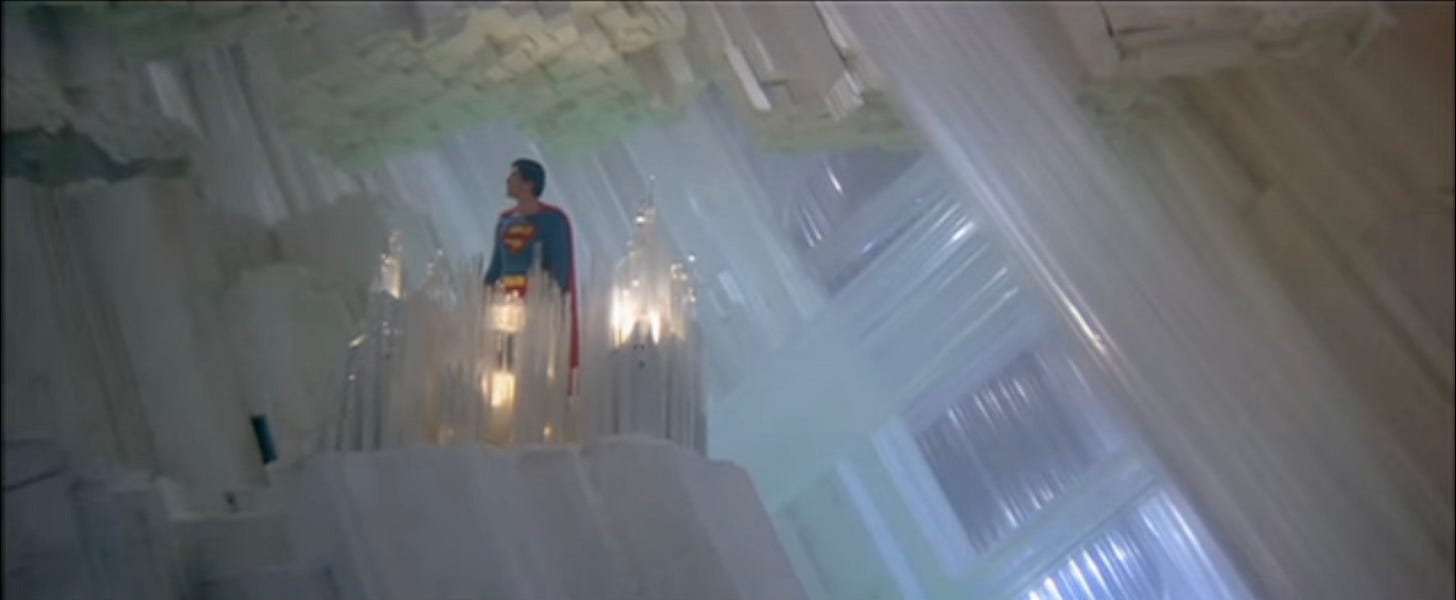
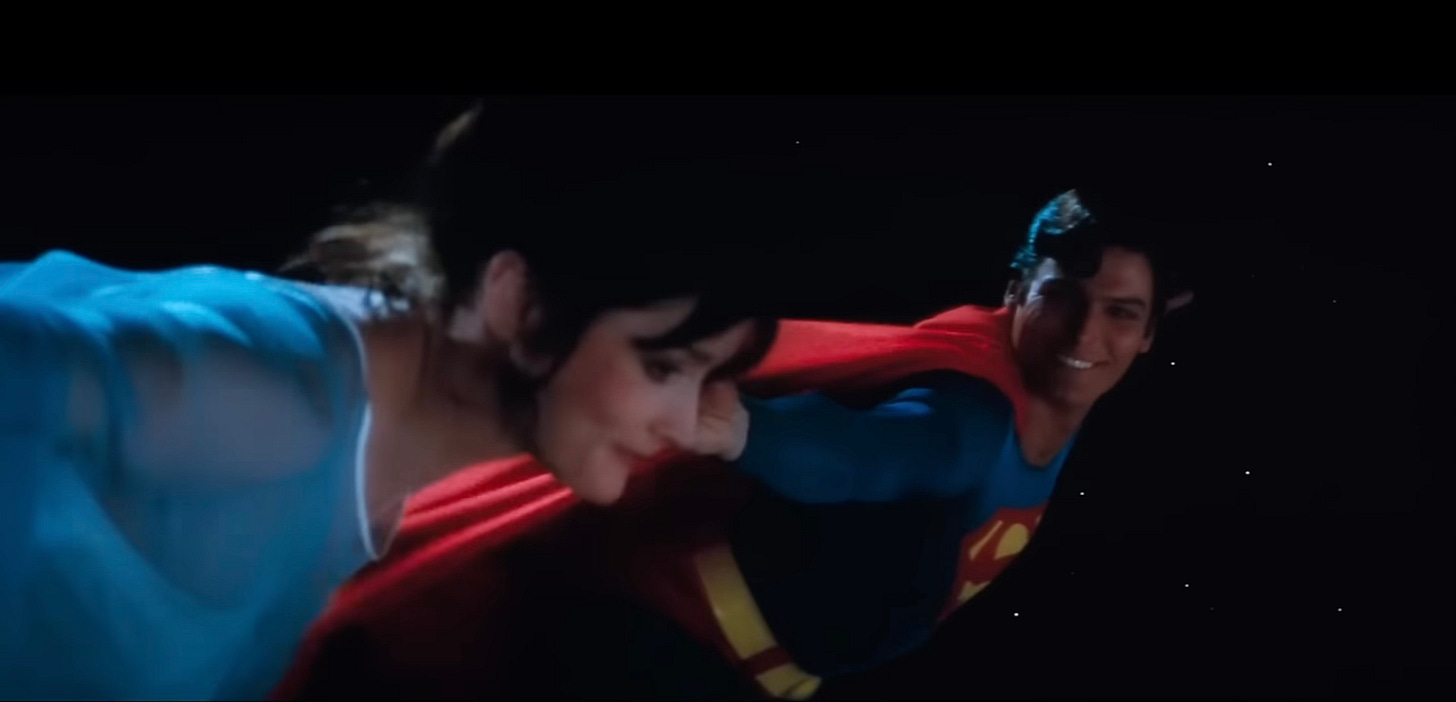

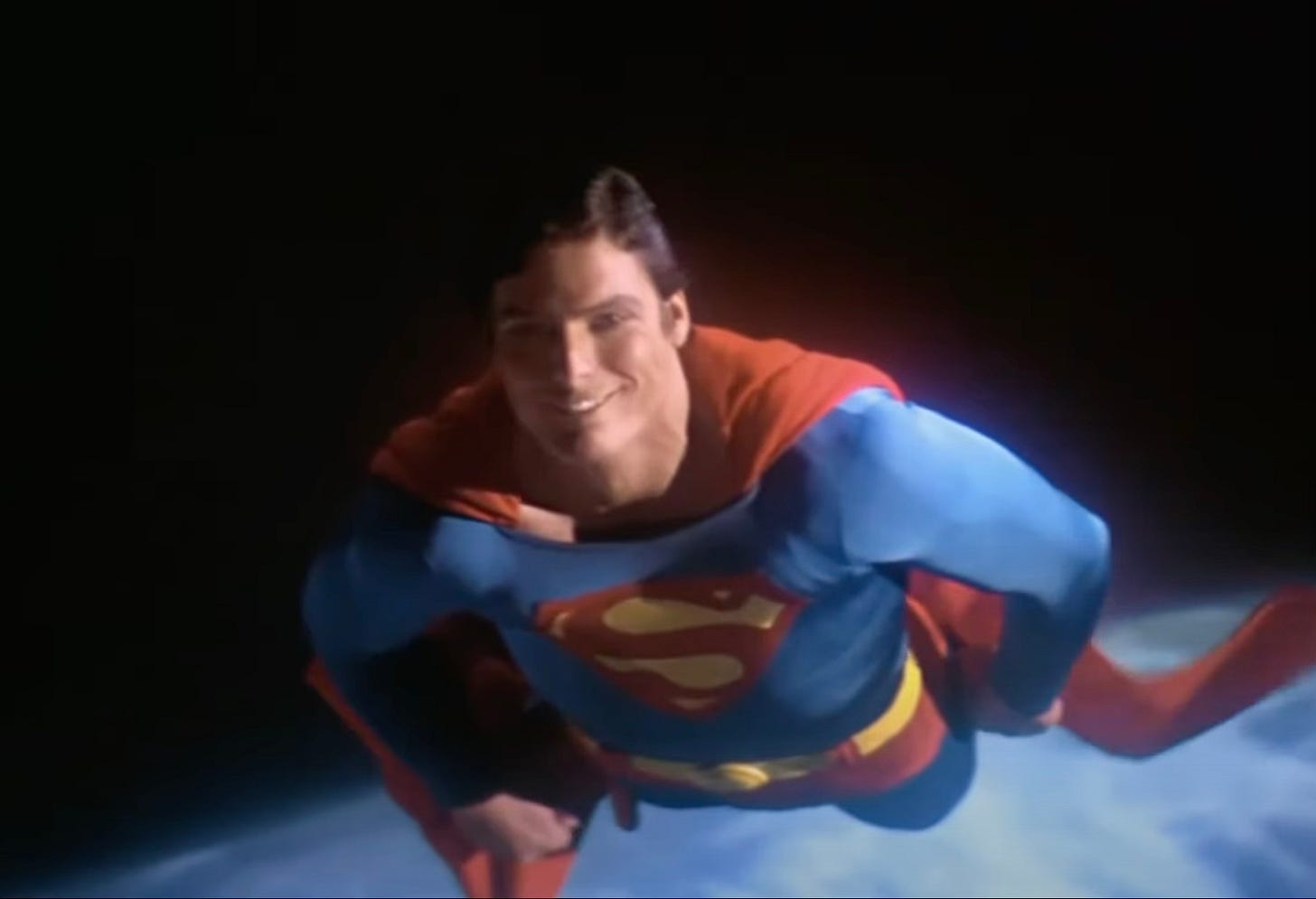
"We’re all part of the same team." Well, naturally. But not always: there was one episode of "The Powerpuff Girls" where a very vainglorious ex-cop tried to kill them for stealing the police's thunder. Neither side always remembers that, but it eternally remains true. (In my universe, many of the superheroes I write about have been given legal status as auxiliary cops, to make it clear).
Where the film differs from a lot of the Superman stories is that Jor-El still manages to play a major role in raising his son, instead of just being a distant memory. But, of course, if you're casting the one and only Marlon Brando in the part and paying him more than any other actor in the movie, he's got to earn his keep.
It's been a minute since I've seen this, but this makes me want to rewatch it; the original movie is such a classic. I admit I've always liked Superman II a bit more, if only because of General Zod, but this is a great reminder why the original is so good.